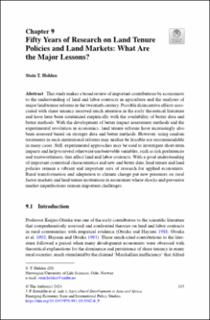Fifty Years of Research on Land Tenure Policies and Land Markets: What Are the Major Lessons?
Chapter
Published version
Permanent lenke
https://hdl.handle.net/11250/3119809Utgivelsesdato
2023Metadata
Vis full innførselSamlinger
Originalversjon
In: Agricultural Development in Asia and Africa. 2022. Ed.: Jonna P. Estudillo, Yoko Kijima, Tetsushi Sonobe 10.1007/978-981-19-5542-6_9Sammendrag
This study makes a broad review of important contributions by economists to the understanding of land and labor contracts in agriculture and the analyses of major land tenure reforms in the twentieth century. Possible disincentive effects associated with share tenancy received much attention in the early theoretical literature and have later been scrutinized empirically with the availability of better data and better methods. With the development of better impact assessment methods and the experimental revolution in economics, land tenure reforms have increasingly also been assessed based on stronger data and better methods. However, using random treatments in such institutional reforms may neither be feasible nor recommendable in many cases. Still, experimental approaches may be used to investigate short-term impacts and help to reveal otherwise unobservable variables, such as risk preferences and trustworthiness, that affect land and labor contracts. With a good understanding of important contextual characteristics and new and better data, land tenure and land policies remain a vibrant and important area of research for applied economists. Rural transformation and adaptation to climate change put new pressures on rural factor markets and land tenure institutions in economies where shocks and pervasive market imperfections remain important challenges. Fifty Years of Research on Land Tenure Policies and Land Markets: What Are the Major Lessons?
